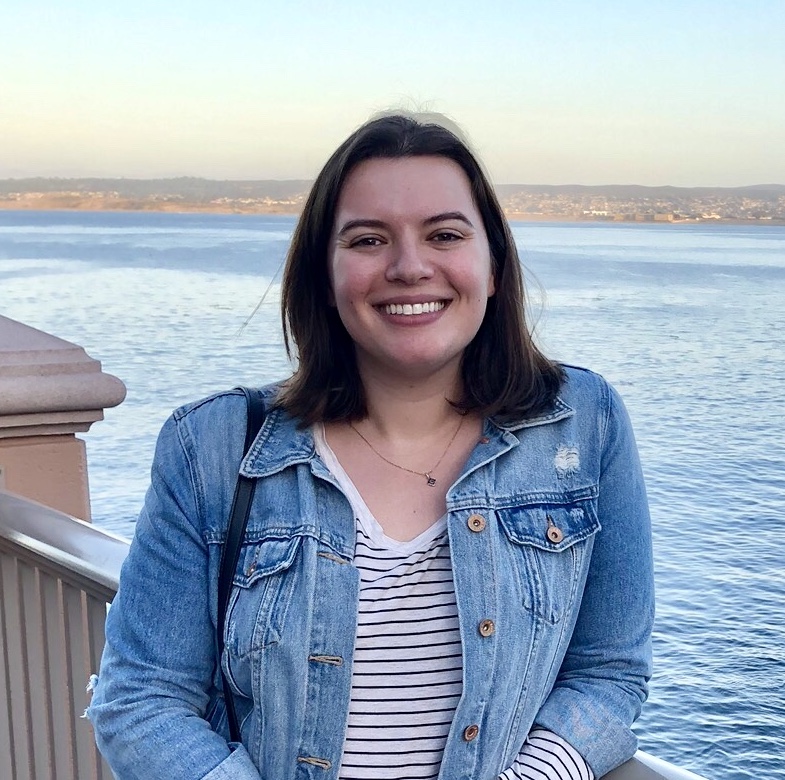 By Lauren Cooley, MLML Vertebrate Ecology Lab
By Lauren Cooley, MLML Vertebrate Ecology Lab
I think it’s safe to say that before the start of this year, no one could have possibly predicted the truly wild twists and turns of 2020- and the year isn’t even over yet! The ongoing Covid-19 pandemic has radically altered the world and for most folks, life over the past 8 months has been pretty chaotic and stressful. I never imagined that on top of all the regular day-to-day stress of graduate school, I would also have to deal with a deadly pandemic, but here we are!
So what exactly has life as a grad student been like during these very strange Corona-times? Lots of people have asked me that question since March, and I typically respond some variation of stressful/overwhelming/profoundly boring/way too much time spent on Zoom. If they happen to catch me on a good day where I have made some big breakthrough with my thesis or had a super productive morning then I might even tell them it’s not so bad. In truth, grad school during a pandemic is a lot like grad school during a normal year: highs and lows. Except now I (almost) never leave my house. So, without further ado, I present a brief Buzzfeed-style look into my life as a Moss Landing Marine Labs (MLML) grad student during the Covid-19 pandemic.
1. The lab shuts down
MLML shut down in March and fully transitioned all students, faculty, and staff members to remote work and classes. While this was absolutely the right call and I am thankful our administration took swift action to prioritize health and safety, it has been very strange working from home all these months. While the lab has now partially reopened to folks on approved research projects, most people are still working remotely. My favorite thing about MLML is the sense of community and I desperately miss sitting in the Vertebrate Ecology Lab chatting with my amazing (and hilarious) labmates, bumping into folks in the infamously long MLML hallway, standing on the deck watching the sunset over the Slough, and all the other little day-to-day happenings that I never fully appreciated in the pre-Covid world.
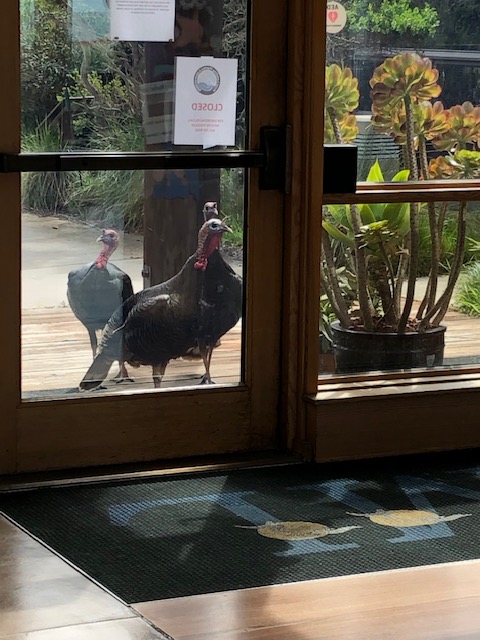
2. Panic! Despair! Stress!
For me, the first few weeks and months of the pandemic were the most stressful. I will completely glued to the news and found it very difficult to focus on anything else. The whole world was in total chaos and everywhere was sold out of toilet paper. My classes, work, and research all seemed so overwhelming and my productivity was at an all-time low. I spent a lot of time during those first few weeks panic-texting my friends while wrapped in a blanket on the couch. Thankfully my cat Honey is an excellent quarantine companion and she kept my spirits up during those early stress-filled days.
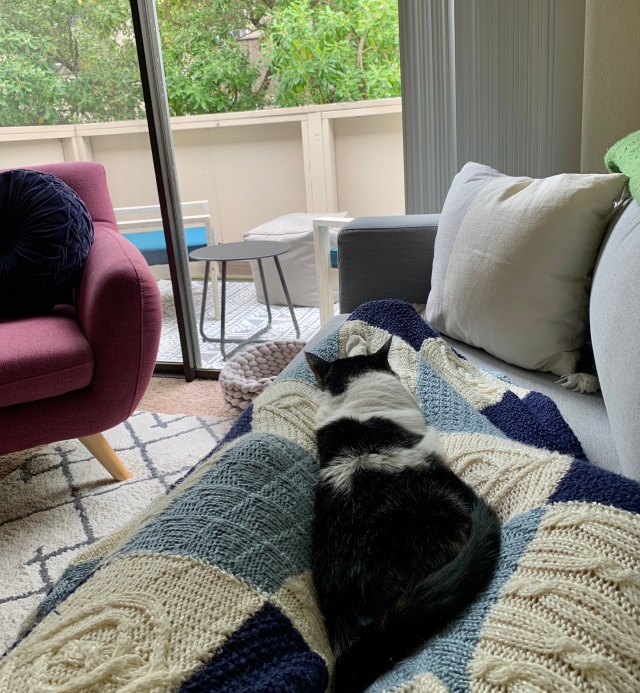
3. My entire life now takes place on Zoom
In 50 years when I think back on the Covid-19 pandemic, the first thing that will come to mind is probably Zoom. Within a matter of days, my entire life moved onto Zoom. Classes, lab meetings, happy hours, research meetings- it’s all on Zoom. I don’t even want to think about how many collective hours I have spent on Zoom over the last 8 months.
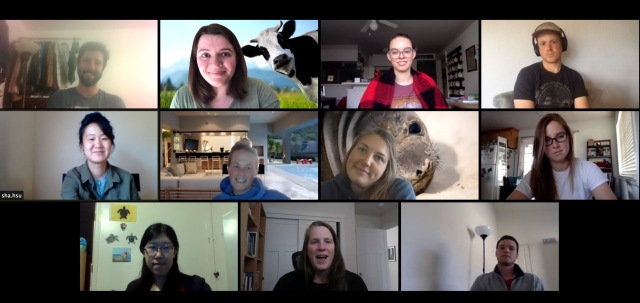
4. We have to cancel our field season 🙁
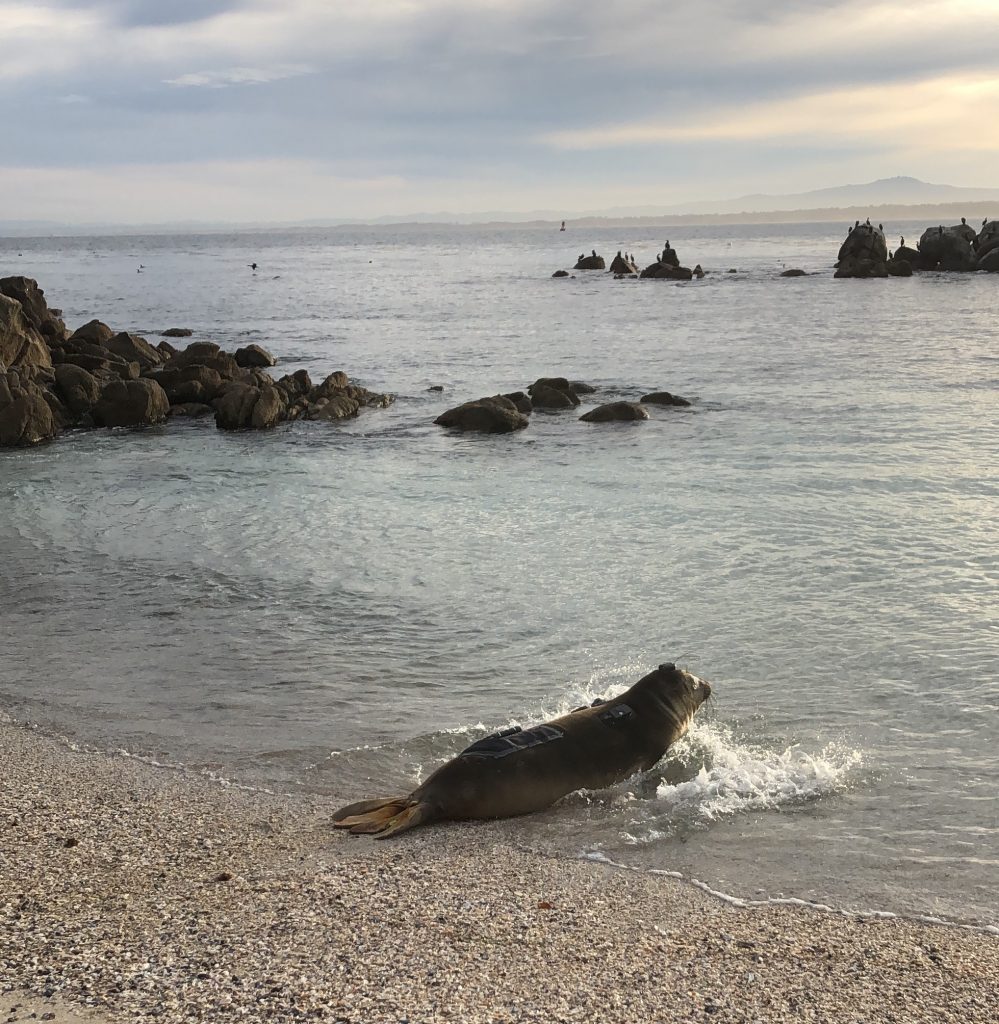
While all my classes and meeting were able to transition onto Zoom pretty easily, there was one big part of my grad school life that simply couldn’t be done virtually: field research. For my master’s thesis, I am investigating the effects of scientific handling (basically all the different things researchers do to animals over the course of an experiment such as capture or transport or overnight holding) on northern elephant seals. I’m part of a big team of researchers working on an NSF-funded study that involves putting biologgers (think very expensive FitBits for marine mammals) on juvenile elephant seals and then translocating them to a different location on the other side of Monterey Bay. Thanks to their strong homing instincts, the seals will swim back home to their colony at Año Nuevo State Park as soon as they are released. While they make this journey home, the biologgers attached to them will collect tons of data for the scientists on my team to analyze.
It’s fascinating work and the absolute best part of the project is the field season where I get to spend an entire month working with a brilliant team of researchers completely entrenched in all things elephant seal. Our team translocated 9 elephant seals in 2019, and our goal was to translocate an additional 10-12 animals in April 2020. That was, until Covid-19 came along and forced us to completely cancel our 2020 field season. This was a huge blow to everyone on our team and we were all extremely disappointed. Thankfully it all worked out in the end and we were able to get an extension from our funding agency. Our final field season has been rescheduled to April 2021 and I can’t wait to get back out there and collect the remaining data I need for my thesis!
5. Quarantine hobbies (aka The Banana Bread Phase)
Like most people, I quickly realized that staying home all day meant I had vast amounts of new free time. And while I love Netflix as much as the next person, there are only so many shows you can watch before you simply need to find something else to do. Here is an incomplete list of all the new quarantine hobbies I tried (and then largely abandoned):
- Baking: Please don’t ask me how many loaves of Chrissy Teigen’s banana bread I have made since March.
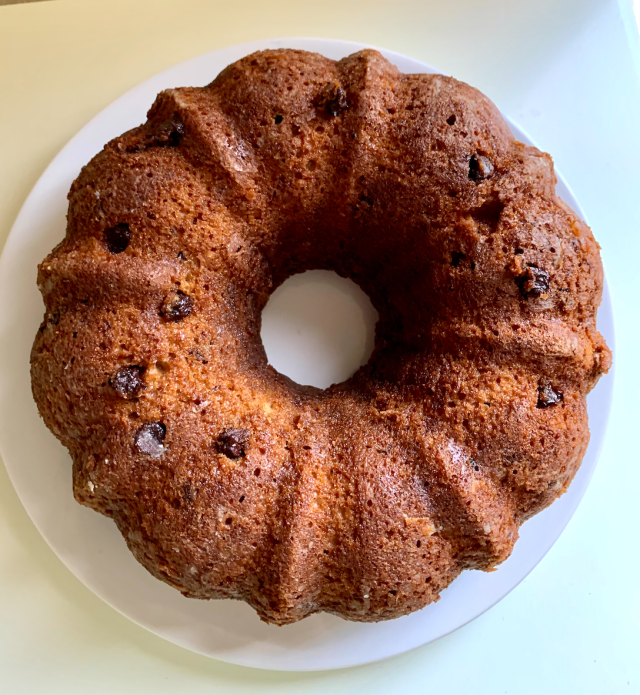
- Macrame: Can you believe I actually made this macrame wall hanging? I am extremely proud of myself for this one!!
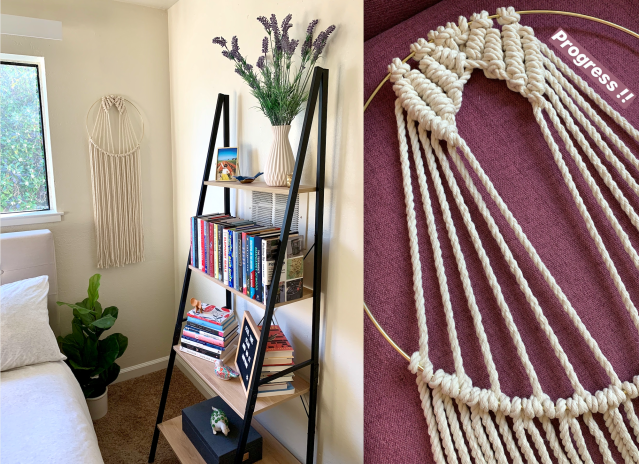
- Origami: I am…. very bad at origami. This was supposed to be a princess but ended up looking like an angry Dorito
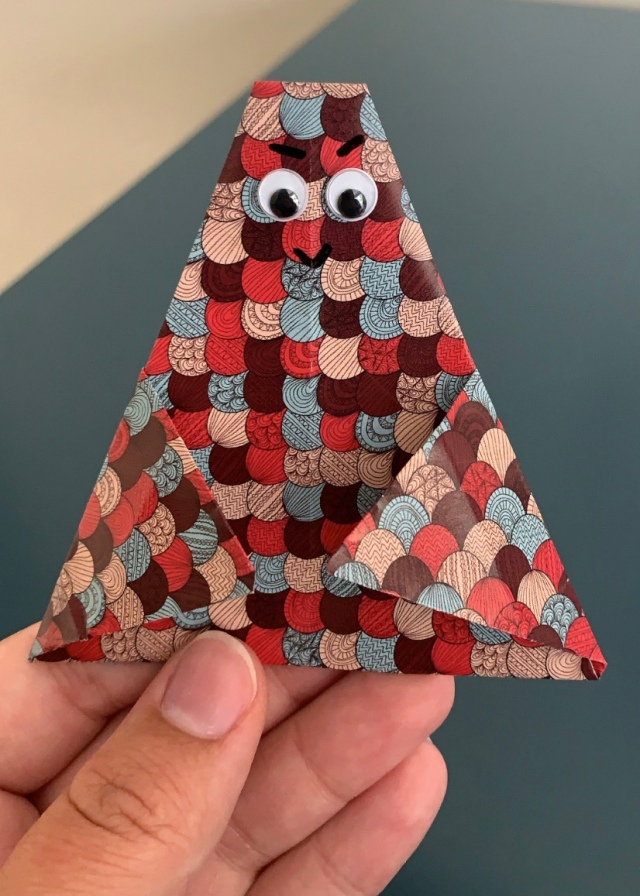
- Rating plants on my Instagram Story: This was a good motivation go get out of the house every day and go on a walk in the early days of quarantine, but looking back on it now I realize just how absurd this was.
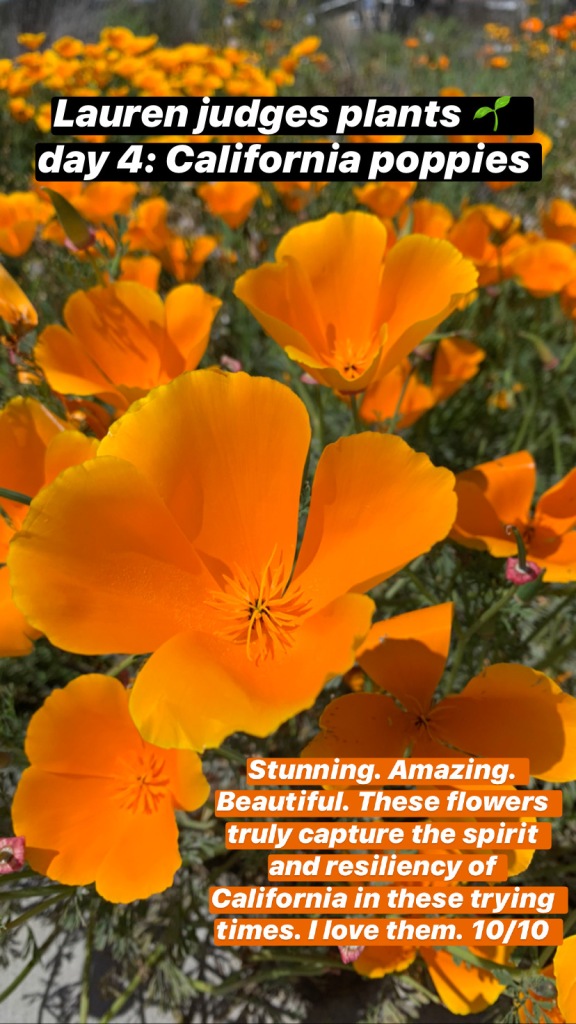
6. MATLAB takes over my life
Okay I promise that in addition to my many newfound quarantine hobbies, I also do occasionally get some real work done. A big part of my thesis research involves analyzing the effect of various research stimuli on elephant seal heart rate. We use an EKG biologger to collect heart rate data from our seals, but unfortunately the biologger isn’t perfect so a lot of the data is noisy and requires manual review and processing in a computer program called MATLAB. My labmate Shawn and I are both working on projects using this data, so we are the ones responsible for processing the hundreds and hundreds of hours of heart rate data from all our seals.
So this is what I do all spring and summer: sit at my desk and process elephant seal heart rate data. I’m not going to lie, it is very boring work, but I listen to lots of great podcasts to pass the time and Honey is always there to keep me company (and provide infinite distractions)!
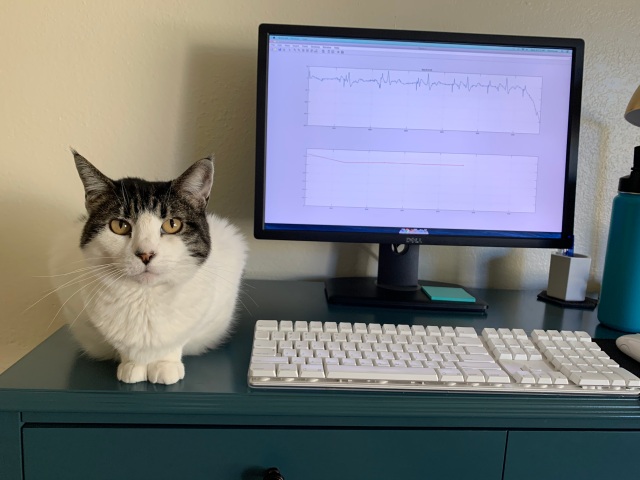
And that’s all folks!
While 2020 certainly wasn’t the year I had hoped for, in the end I was able to adapt to a very different style of grad school and I even made a lot of progress on my thesis! I owe a huge debt of gratitude to my amazing friends, labmates, colleagues, professors, and advisor who have made the transition to remote grad school bearable, and occasionally even fun. And now I’m back to MATLAB…


